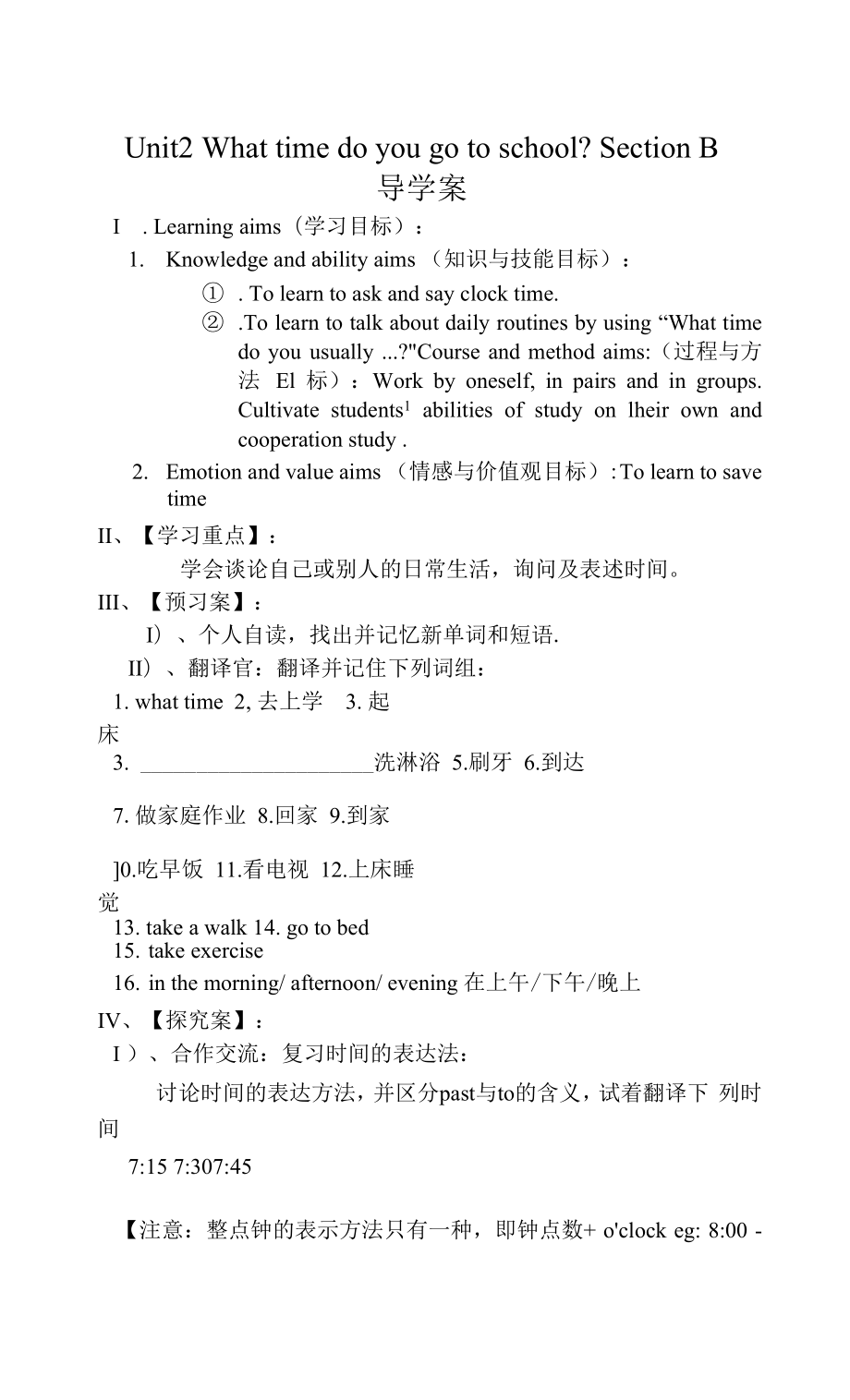《Unit2SectionB導(dǎo)學(xué)案 人教版七年級(jí)英語(yǔ)下冊(cè).docx》由會(huì)員分享,可在線閱讀�,更多相關(guān)《Unit2SectionB導(dǎo)學(xué)案 人教版七年級(jí)英語(yǔ)下冊(cè).docx(3頁(yè)珍藏版)》請(qǐng)?jiān)谘b配圖網(wǎng)上搜索。
1��、Unit2 What time do you go to school? Section B
導(dǎo)學(xué)案
I . Learning aims(學(xué)習(xí)目標(biāo)):
1. Knowledge and ability aims (知識(shí)與技能目標(biāo)):
① . To learn to ask and say clock time.
② .To learn to talk about daily routines by using “What time do you usually ...?"Course and method aims:(過(guò)程與方法 El 標(biāo)):Work by oneself, in p
2���、airs and in groups. Cultivate students1 abilities of study on lheir own and cooperation study .
2. Emotion and value aims (情感與價(jià)值觀目標(biāo)):To learn to save time
II、【學(xué)習(xí)重點(diǎn)】:
學(xué)會(huì)談?wù)撟约夯騽e人的日常生活�����,詢問(wèn)及表述時(shí)間�。
III、【預(yù)習(xí)案】:
I)��、個(gè)人自讀��,找出并記憶新單詞和短語(yǔ).
II)�����、翻譯官:翻譯并記住下列詞組:
1. what time 2, 去上學(xué) 3. 起
床
3. 洗淋浴 5.刷牙 6.到達(dá)
7.做
3、家庭作業(yè) 8.回家 9.到家
]0.吃早飯 11.看電視 12.上床睡
覺(jué)
13. take a walk 14. go to bed
15. take exercise
16. in the morning/ afternoon/ evening 在上午/下午/晚上
IV�、【探究案】:
I )����、合作交流:復(fù)習(xí)時(shí)間的表達(dá)法:
討論時(shí)間的表達(dá)方法�,并區(qū)分past與to的含義��,試著翻譯下 列時(shí)間
7:15 7:307:45
【注意:整點(diǎn)鐘的表示方法只有一種,即鐘點(diǎn)數(shù)+ o'clock eg: 8:00 - eight o'clock】
II )����、Work in pairs
4�、? 練習(xí)對(duì)話A: When do you usually get up?
B: I get up at 6:30.
Ill)n Work in groups: talk about daily routines by looking at the pictures.
V、【課堂檢測(cè)】:
I����、精挑細(xì)選
()1. What time does Lindaafter school?
A. do her homework B. does her homework C. do her homeworks
()2. They often have lunch12:00.
A. in B.
5�、at C. on
()3. When do youevery day?
A. go to homeB. go homeC. go a home
()4.It's seven o'clock. It's time to go.——OK, Let's
go.
A. the schoolB. to schoolC. my school
()5. —does he have breakfast?—At ten past six.
A. WhatB. WhereC. What time
()6.——do you go to school?
----1 often go to schoo
6�����、l7:30 pm.
A. What time, on B. What time, at C. When, in
()7..your friendhomework?
A. Does, doesB. Do, doesC. Does, do
()8.1 go towork afterbreakfast every day.
A. /, theB. /, /C. the, a
()9..——When do you dohomework?
——I often dohomework in the evening.
A. you, me B. your, my C. your, me
()
7����、1().. 8:3() am means (意思是).
A. half past eight in the morninghalf to eight in the morning
B. half past eight in the afternoon
II�、補(bǔ)全對(duì)話
A: Tom. You have a big family. We want to know about your family.
B:OK.
A: When do you?
B: I run in the morning.
A:does your brother run?
B: He runs at 7:00.But my father runs(在
下午).
A: Does your sister go to school?
B:Yes. He8:00.
 Unit2SectionB導(dǎo)學(xué)案 人教版七年級(jí)英語(yǔ)下冊(cè).docx
Unit2SectionB導(dǎo)學(xué)案 人教版七年級(jí)英語(yǔ)下冊(cè).docx

